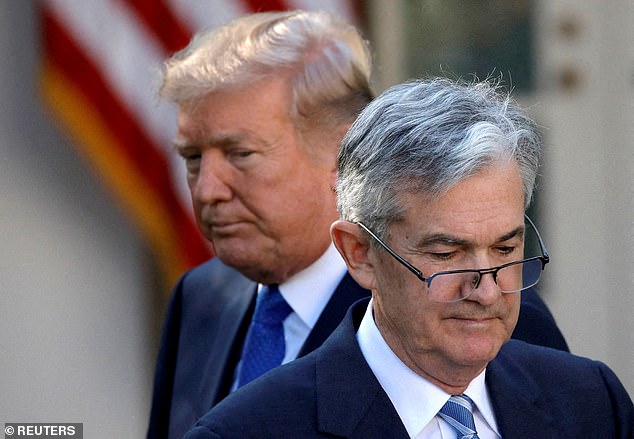The latest quarter-of-a-percentage point cut in US interest rates – to a 3.75 per cent to 4 per cent range – was widely anticipated.
A go-slow on rate cuts in the US, as the labour market softened, has been a big bone of contention between the Federal Reserve chairman Jay Powell and Donald Trump.
The President has sought to humiliate the central banker, who he has described as a ‘knucklehead’ and a ‘stiff’ for keeping rates too high for too long.
A demand by the US Treasury secretary Scott Bessent for cuts of at least 1.5 percentage points and Trump’s demand for double that made the American central bank ever more determined to resist bullying which could undermine Fed independence.
The lengthy five-week US government shutdown means economic decision-makers have been flying blind without the usual plethora of new data.
White collar jobs are vanishing rapidly, with Amazon scything 14,000 jobs this week, delivery firm UPS revealing the loss of a similar number of posts, and retailer Target among the firms letting people go.

Feud: A go-slow on rate cuts in the US, as the labour market softened, has been a big bone of contention between the Federal Reserve chairman Jay Powell and Donald Trump
Much of the blame is being placed at the door of artificial intelligence (AI). A rate reduction was regarded as a done deal.
In contrast, the prospect of a cut by the Bank of England on November 6 has been seen as remote.
It appeared unlikely that, with the Budget looming, the Bank would act next Thursday until the Chancellor Rachel Reeves shows her hand.
But, with inflation holding at 3.8 per cent last month, and Britain’s jobs market cooling, the odds of a UK cut have increased.
Encouraged by falling food prices, economists at Goldman Sachs are urging the interest rate-setting Monetary Policy Committee to lower rates.
That would offer a much-needed fillip to consumer and business confidence horribly battered by the prospect of swingeing tax increases.
Fond farewell
Every chief executive wants to go out on a high, and Emma Walmsley is doing that.
Her last results presentation as GSK boss is a tribute to courage in seeing activist investor Elliott off the field of battle, spinning off consumer healthcare arm Haleon and catching up on oncology.
The strong performance of Jemperli, an immunology medicine for endometrial cancer, provides testimony to that.
It is not just in the interest of GSK investors and colleagues that the company does well. Britain’s life sciences are among the keys to a better future; the lack of recognition for Big Pharma since Labour came to office is an irritant.
Walmsley used the third-quarter results briefing to reiterate that it would be a mistake for the Chancellor to undermine the UK’s tax competitiveness.
Pharma benefits from both R&D credits and the Patent Box scheme, which lowers corporation tax, introduced in 2013.
GSK now expects annual sales and profits to exceed previous targets, and earnings per share growth to come in at 10 per cent – 12 per cent – up against a previous range of 6 per cent – 8 per cent .
Sales of its ground-breaking HIV treatments rose 12 per cent to £1.9billion. Vaccine revenues have slumped in the US, where health secretary Robert F Kennedy Jr’s bizarre anti-vax views are wreaking havoc, with sales of Shingrix struggling.
Vaccines are doing well in Europe and GSK has hopes that early trials, which show that shingles shot Shingrix can be effective in treating dementia, will be borne out in large-scale studies.
GSK shares have been living in the shadow of UK rival AstraZeneca. But a 6.6 per cent rise in trading yesterday means that it is outperforming, with a 30 per cent gain so far this year. Phew!
Cutting loose
The ‘Cable Cowboy’ John Malone has been shedding assets, with a stake in ITV halved as he seeks to simplify his empire.
Now the 84-year-old media and Formula One magnate is shedding himself by retiring as chairman of Liberty Media and Liberty Global.
Malone fought a titanic battle with Rupert Murdoch in the Noughties which resulted in an asset swap and the Fox network tycoon having to buy out Liberty’s stake in his empire.
Malone’s departure could unlock his 50 per cent ownership of Virgin Media and a remaining 5 per cent holding in ITV.
Watch this space!
DIY INVESTING PLATFORMS

AJ Bell

AJ Bell
Easy investing and ready-made portfolios

Hargreaves Lansdown

Hargreaves Lansdown
Free fund dealing and investment ideas

interactive investor

interactive investor
Flat-fee investing from £4.99 per month

InvestEngine

InvestEngine
Account and trading fee-free ETF investing

Trading 212

Trading 212
Free share dealing and no account fee
Affiliate links: If you take out a product This is Money may earn a commission. These deals are chosen by our editorial team, as we think they are worth highlighting. This does not affect our editorial independence.
